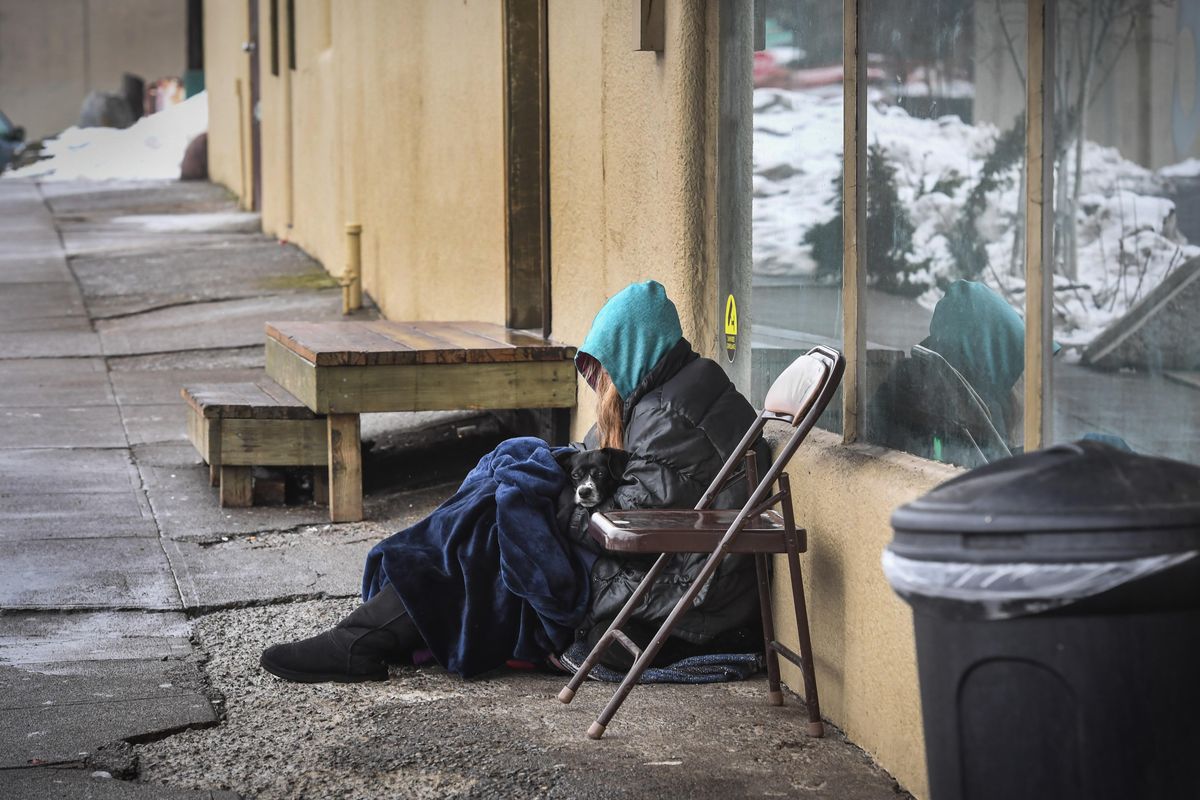Panel disagrees on approaches to Spokane’s homelessness problem

A panel of social service providers and policymakers disagreed on the causes of homelessness and its solution Thursday.
The local Young Professionals chapter of the nonpartisan Washington Policy Center hosted the panel discussion.
The panel included Jonathan Mallahan, vice president of housing at Catholic Charities; Spokane City Councilwoman Kate Burke; Mark Richard, former Spokane County commissioner and current CEO of the Downtown Spokane Partnership; and Phil Altmeyer, executive director of the Union Gospel Mission.
Burke said the district she represents is poor and homelessness is an issue. She said the community needs to do more. “We do have great services in place, we’re just not funding them,” she said.
She spoke about a friend of hers from elementary school who later became addicted to meth. Her friend was able to get clean with help from Catholic Charities. “They kept him alive long enough that he could make a decision to become clean and sober,” she said.
Richard said he hears from business owners every day who say homeless people are causing problems for them either because they are causing property damage or making customers feel unsafe. He said he believes many people are homeless because of addiction.
Burke said the University of Washington and the Washington State Department of Commerce have done studies that show that the top two causes of homelessness are rent increases and evictions. She said the city needs new policies to help keep people in their homes in addition to helping the homeless find housing.
“This is absolutely a housing issue,” she said. “We’re not building low-income housing.”
Spokane has about a 1% apartment vacancy rate and rents have skyrocketed 25% in the last five years, Burke said. “Rents are raising at unmanageable rates,” she said. “There’s no policies in place to stop landlords from doing that.”
She said some people do become homeless because of mental illness or drug use, but they aren’t in the majority.
Altmeyer said he believes that people who lose their homes for reasons other than drug addiction are able to quickly get help and find new housing. “They are able to find housing,” he said. “We’re in denial if we don’t think 80% are homeless because of addiction.”
Richard said there’s no single cause of homelessness. “There are multiple facets to homelessness,” he said. “We can’t put everyone in the same bucket. We have affordability issues and addiction issues.”
He agreed that the city does not have enough housing and said relaxing development regulations and changing the Growth Management Act would be a solution. “We need to get out of the way of the private sector,” he said.
Altmeyer said he’s seen changes in the 33 years he’s worked with the homeless. “I see that people’s hearts have become hardened toward helping the homeless,” he said. “I feel we’re on the brink of becoming like Seattle and that concerns me.”
Many people are homeless because of poor choices they’ve made, Altmeyer said. He said he believes people should be encouraged to reach their God-given potential, but not be handed things that they then become dependent on. “Today, people expect to be taken care of,” he said. “The system is broken. The way you fix the system is to help people believe in themselves.”
Mallahan said the homeless problem is improving. In recent years Catholic Charities has built several apartment buildings designed for the chronically homeless. “Chronic homelessness is down 21% in Spokane,” he said.
Their mission is to bring dignity to the vulnerable, Mallahan said. “Catholic Charities provides the grace of housing without condition. Addiction is a disease. It starts with some choices, but it is a disease.”
Altmeyer said he believes that some homeless people who refuse services offered to them prefer living outside. “I think there are choices people are making,” he said. “For some people, sad to say, it’s become a lifestyle.”
Mallahan said people who say they like living outside have simply given up and are afraid of trusting anyone after previous failures. “That’s a defensive position,” he said.
Catholic Charities does not require that people be drug- and alcohol-free before being approved for housing. People need stable housing so they can recover, Mallahan said. “You can’t do that in the midst of chaos,” he said. “We see them stabilizing. We see them improving their lives.”
Altmeyer suggested that Spokane follow Olympia’s lead and establish a camp for the homeless, but Mallahan spoke strongly against the idea.
“If Spokane’s answer is to create a tent city, we have failed,” Mallahan said. “Those are dangerous, unsafe, terrible places to live. You need real housing where you feel safe and secure.”
In the end there is probably no one policy that will solve homelessness, Mallahan said. “You’re going to have a different approach for different needs,” he said.